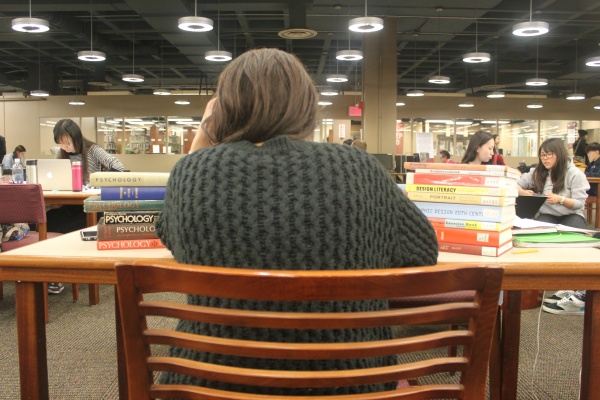The Search For Cheaper Textbooks Is On
January 28, 2016
College students returning to school after break are once again faced with problem of finding affordable textbooks. When comparing prices from the Fordham University at Lincoln Center (FCLC) Bookstore with other providers such as Amazon, Barnes and Noble and Chegg, those from our campus bookstore are generally overpriced.
A major decision students face is whether to rent or to buy their textbooks. Felicity Richards, FCLC ’19, chooses to purchase books that only apply to her major. “If I rent, I prefer to rent new books simply because then I can actually take my own notes,” she said. Renting seems to be the cheaper option rather than purchasing a book new, because if it does not prove a necessity after the semester ends, it can be returned.
Mariella Sypa, FCLC ‘19, ordered all of her books on Amazon for this semester after the school bookstore allegedly overcharged her last semester. “I got stuck buying a $200 plus textbook at the bookstore when I could have rented it for less than half of that,” she stated. “Now I want to rent from Amazon as much as possible or look into one of those online sites like Chegg.”
Amazon offers college students many benefits, such as free two-day shipping after signing up for Amazon Student. However, after the free six-month trial expires, Amazon will upgrade you to Amazon Prime where you will pay $49.50 a year for it instead of the original price at $99.
Samantha Wei, FCLC ‘19, will continue to order from the school bookstore because she feels that its prices are reasonable. “I think the textbook industry as a whole is an overpriced industry, but [it] can do so since schools require certain books and only one publisher prints that required textbook,” she said.
Wilson Leon, the bookstore’s manager, admitted that it does not price check with online sites such as Amazon. Instead, it is more competitive with other retailers that offer similarly valued textbooks.
“Offering students affordable textbooks is a top priority of the bookstore, which offers a variety of textbook options including rental, used, digital and new, and is dedicated to helping students find the course materials they need in the format that best suits their learning style and budget,” he stated.
He added, “Online textbook competitors do not provide that type of guarantee or level of commitment and service to campus-specific textbooks, When an online textbook retailer runs out of a book, they may re-order, but they may not. The Fordham University Lincoln Center Bookstore guarantees that every student has the book he or she needs, even if that means reordering a single copy.”
There is also the question of whether the professor who required a certain textbook will actually use it in class. Students such as Sypa run into issues where professors require specific, costly textbooks and never use them in class.
“One of my professors said we could only buy or rent a new copy of his own book last semester,” she explained. “I was really upset by the end of the course, because his book was essentially the same as the free slides he sent us. It felt like he just ordered it to make money.”
However, Ashar Foley, an adjunct professor of communication and media studies at FCLC, focuses on the prices of each book she requires before making her syllabus. “I choose textbooks for my courses after taking into consideration both what other instructors have used in the past and what is available on the market. I absolutely do look at the prices of the textbooks that I choose for my classes—I have to purchase them myself!”
Foley does not like to spend an exorbitant amount of money on the books she uses in class either, especially if it will be irrelevant for her students beyond the course.
Foley is also one of many professors who utilizes Blackboard as a means to post assigned readings for students rather than purchasing a book that will only be used for a short period in class.
“The ethical rule of thumb for PDF use is that, if assigning more than two chapters from a book, teachers should require their students to buy that book. I use PDFs to ensure that [my students] read a range of material, outside of and in addition to the main textbooks.”












